#mind boggling truly
Explore tagged Tumblr posts
Text
They’re posting memorial pictures of the israeli hostages the IOF killed and why did they chose a pic of one of the guys that has a poster of a naked woman posing in front of a confederate flag in the background???
It’s so funny, read fucked, that confederate imagery makes its way all around the world wherever white supremacy nestles in. Cause how you gon claim you’re indigenous to the Middle East but have the flag of a losing army from a different country up??
#mind boggling truly#very sick and twisted#like did he deserve to be executed by his own state?? no absolutely not#does a picture like that increase sympathy from mfs like me?? no absolutely not#be serious#free palestine
8 notes
·
View notes
Text
'ao3 needs a like and dislike button'
what you need, my algorithm-rotten minded friend, is a grip
#ao3#archive of our own#what.do.you.MEAN#how do these takes still find me#HOW#'but I only want to read the good stuff' THAT MEANS DIFFERENT THINGS TO DIFFERENT PEOPLE#THERE ARE HIDDEN GEMS YOU WONT EVEN FIND#also you know what you TRULY want? fics recs it's called fic recs but hey cant have that if you dont read THE FUCKING FICS first#imagine thinking fanworks are uniquely for your consumption and products to be ranked on a scale#ANYWAY it just boggles the mind
2K notes
·
View notes
Text


Lost in the sauce
141 notes
·
View notes
Text
we really do not focus enough on the fact that dalinar told adolin and renarin about evi via having someone read oathbringer to them like imagine your dad writes an autobiography and has someone read you an advance copy and the whole time you’re like ok raiding and pillaging kind of absent parenting i knew all of this. sure. and then like halfway through he drops that he KILLED YOUR MOM. and chose to tell you this via memoir. and then you just have to keep going about your day i guess
#actually for that matter imagine being the scribe who had to read it to them. good lord.#genuinely do not mean this as a dalinar bashing post or whatever it truly was just such a fucking crazy move#i think about it all the time. truly boggles the mind
58 notes
·
View notes
Text
I think tlovm is super impressive just for the fact it’s an adaptation. While it isn’t perfect, the show has to adapt a fucking gargantuan amount of highly detailed content. Literally hundreds of hours of story and tiny character interactions and lore and NPCs and move for move combats and every other thing, have to be turned into 12 or so ~20 minute episodes per season. That is a truly absurd amount of stuff to condense, and the show does so pretty damn successfully. Adaptations with far less ground to cover do a whole lot worse. Especially given that, while every switch between mediums is hard and requires some changes to the story, a story told through dnd has the game system woven into every aspect of the characters and the world, and that has to be mostly taken out in the show. Core metaphysics of the universe have to be changed, concepts on which huge story elements are built have to be fully replaced. It is an absolute beast of a thing to adapt. Just the fact that the show exists at all is incredible to me.
#the difference between economy of storytelling is INSANE#the game had hours and hours to do something#the story has 3 minutes tops to do#it is truly mind boggling#critical role#tlvom#the legend of vox machina#cr#vox machina
2K notes
·
View notes
Text
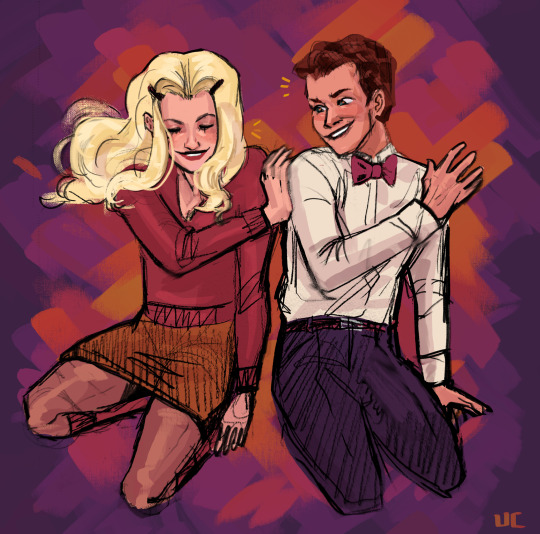
Re-reading untold tales kills me every time, They Were Babies 🥺
#spider-man#harry osborn#gwen stacy#marvel#art#my art#i was Not in a line art mood so i sketched this one traditionally but anyways#it wounds me whenever harry is added into the highschool era but gwen isnt#harry and gwen were best friends first!#spect-acular at least made them friends somewhat outside of peter but still#everything about their friendship is such a goddamn tragedy#and the fact that none of the adaptions truly want to go into it#truly fucking boggles the mind
351 notes
·
View notes
Text
bad softly telling pac its okay over and over again, that he's here for him, asking him questions to keep his mind off of the message, talking to him about richarlyson...oh how the tides have turned
#qsmp#again bad mending friendships w pac and tubbo while burning all his other bridges is truly the most mind boggling thing from purgatory
206 notes
·
View notes
Text
I am truly the master of dispersed camping at this point. never pay to camp on public lands my friends sleep in insane locations for free
#i love to find random places to sleep on wretchedly maintained NF roads as is my right as a taxpaying citizen#it truly boggles my mind how many people dont realize that's something that is legal and encouraged to do.#its public lands!!!! you are the public!!!! those are your lands!!!!!#beckett.txt
64 notes
·
View notes
Text
and you're telling me jayce could resist kissing this viktor

#well lets just say i couldnt#you just wait til i finish my rewatch i AM going to write this missing scene fic#the utterly unhinged dimensions of jayce finding out he's been chasing viktor all along#it boggles the mind truly. the circles they run around each other#arcane#jayvik
36 notes
·
View notes
Text
I'm so behind on replying to comments it's criminal

#I LOVE U AND I SEE YOU#EVERY COMMENT IS PRECIOUS AND I'LL REPLY TO EVERYONE#the response to Incandescent is truly mind boggling#i did not expect that#and I'm so grateful and i know i say it every time but it's true#everyone receives a kiss on the forehead from me
19 notes
·
View notes
Text

the chaos it would have been if they knew each other as kids. truly we cannot comprehend
#butterfly soup#butterfly soup 2#ppkm#roi draws#ppkmweek2023#when I say we cannot comprehend truly I mean I have no idea how this would affect the timeline (the being of childhood friends)#like either they get together WAY sooner or WAY later. but I think their exchanges would stay a constant regardless of age#I think I had this complex diyelle roomates au where akarsha and noelle were childhood friends but I really can't remember where I was goin#with that one back then. truly boggles the mind to think about#actually i'm probably alone in this. my mind is boggled all the time#that might just be the burnout baby
142 notes
·
View notes
Note
I haven't been on Tumblr that much lately (my mental health has been shitty) but coming back here and seeing your art is just !!! it really makes me happy every time you post something. Thank you 💚
gawwww thank you!! I’m glad it can bring you some joy in these trying times, I hope your mental health improves swiftly, and that you take care of yourself in the meantime <3
#ask#crazy to think people seek out my art to like. comfort themselves when they’re feeling bad#truly mind boggling im glad y’all are here ily
30 notes
·
View notes
Text
In today's episode of Shut Up Robin, Nobody Cares:
I finished Maison Ikkoku back in February, and I had a lot of feelings about the series. (It's good, do yourself a favor and go read it if you haven't.) As I read through it, I couldn't shake the thought: this is the caliber of romantic development Rumiko Takahashi can bring to the table?? We could've had this kind of relationship development in InuYasha??? 😭😭
The other thought I couldn't shake: InuYasha fans who still question the sincerity and depth of InuYasha's feelings for Kagome might benefit from reading Maison Ikkoku all the way to the end. They should read the final chapters of Maison Ikkoku, think for awhile about the blatant parallel themes found in InuYasha, and then try reevaluating InuKag's dynamic.
Now, I should clarify: I think the InuYasha series already makes it abundantly self-evident that the Inu/Kag/Kik "triangle" (🙄) is a complex situation that puts InuYasha in an extremely difficult position. (Well, it puts all of them in a difficult position, but you get the idea.) You just have to read the series with your brain on to see that. To review: teenage boy is tricked and terrorized by a demonic murderer; that demon successfully murders the boy's ex while masquerading as him; later his ex is revived from the dead against her will, wanders the earth as a vengeful spirit for awhile (who wouldn't be pissed about being brought back into that bullshit?), and is actively stalked by the demon who already murdered her once; teenage boy is falling in love with someone else when this happens, but he still wants to save his ex from being re-victimized by the demon who already brutally murdered her once. Anyone who sees that situation and describes it with a straight face as "InuYasha needs to make up his mind already" is probably never going to reconsider their assessment of InuYasha's character. They've already formed an opinion in defiance of the evidence. That ship done sailed.
But for some folks, I think experiencing the way Maison Ikkoku explores the same relationship themes—and particularly how it resolves those themes in the final chapters—could help them re-evaluate the emotional nuances in InuKag's relationship, and maybe help to re-contextualize the Inu/Kag/Kik conflict.
The parallels between Godai/Kyoko and InuYasha/Kagome are pretty obvious—Rumiko Takahashi consistently revisits this relationship dynamic in her work (it's present in Mao to a lesser extent). But I think Maison Ikkoku more directly confronts the emotional complexity of that dynamic. You can feel the difference in how RT more directly explores the messiness, complications, and pain of a) grieving a former relationship even while falling in love with someone else, and b) loving someone who is still tangled up in grieving their past. The InuYasha series obviously deals with those themes too, but Maison Ikkoku brings more focus and resolution to its exploration.
This may be for two reasons: 1) Maison Ikkoku had an older audience, as it was published in a seinen magazine geared for adult men between 18 - 40 years old, and 2) the relationship tension between Godai/Kyoko pretty much constitutes the main story of Maison Ikkoku; in InuYasha, the plot (such as it is) revolves around a vengeance quest and the monster of the week, and the relationship tensions between InuKag are second to that. Maybe that's why RT was more willing to get into the weeds with Godai/Kyoko and to more directly resolve the tension.
InuYasha does have some standout chapters where it explicitly deals with the tension of InuKag's situation (e.g., chapter 78, chapter 124, chapter 176, chapter 286, chapter 458, etc.), but there's this distinct hesitance in the narrative to resolve that tension in a substantive way. That's one of my beefs with the InuYasha series: it gives us moments of standout, concrete relationship development which then doesn't impact the future narrative all that much. The same relationship conflicts play out over and over again, well past their narrative expiration dates. See: Miroku flirting with women right in front of Sango after they've acknowledged feelings for each other; also the entire Kaō arc, which just... I do not understand the narrative purpose of that arc when it just exacerbates tensions that already existed and resolves none of them. Anyway. I digress.
You could argue this hesitance to permanently resolve relationship conflict comes from the episodic nature of InuYasha's storytelling. There's some truth to that, but that's not a satisfying explanation for why the main couple's relational status quo remains inert for the latter half of the series. Maison Ikkoku also does this to an extent—the "will they, won't they?" tension is strung along for as long as possible—but in general Maison Ikkoku does a better job of allowing relationship development to actually affect the narrative. Moments of emotional revelation and growth do change the relational status quo between Godai and Kyoko. They don't stay in quite the same relationship limbo that InuYasha and Kagome get stuck in for the latter half of the series. (It probably also helps that Maison Ikkoku is significantly shorter than InuYasha.)
All that to say: I think Godai/Kyoko is actually a useful mirror for examining InuKag, because they share the same themes and relationship dynamics without sharing the same narrative failings.
Okay, so: big time major spoilers ahead for Maison Ikkoku. Stop here if you don't want to see the conclusion of that series.
I want to look at how Maison Ikkoku's conclusion simultaneously revisits and resolves the main conflict between Godai/Kyoko.
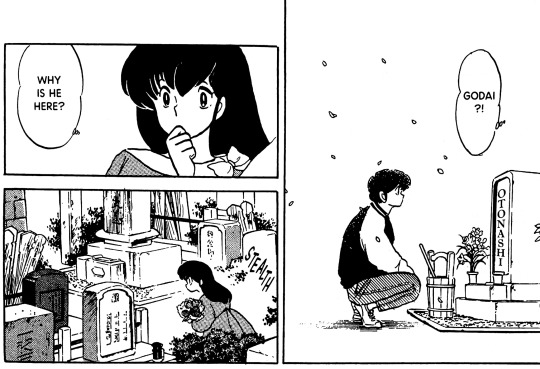
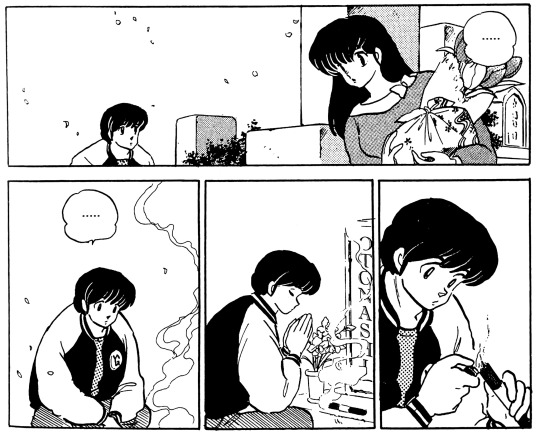
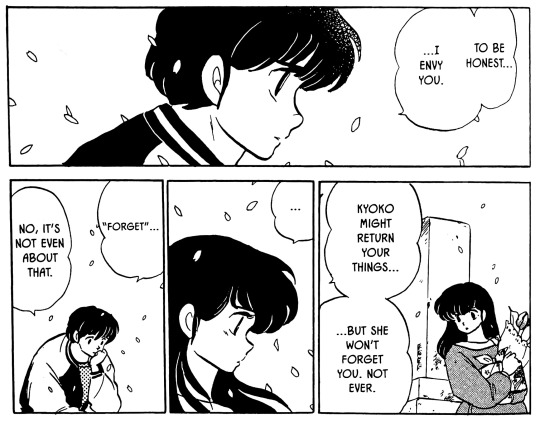
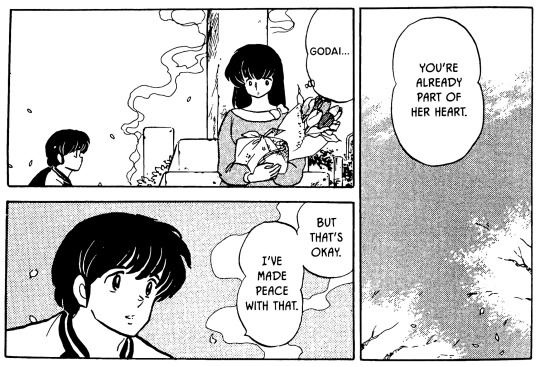
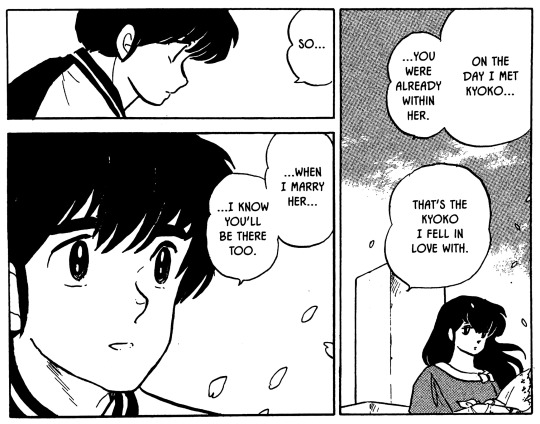
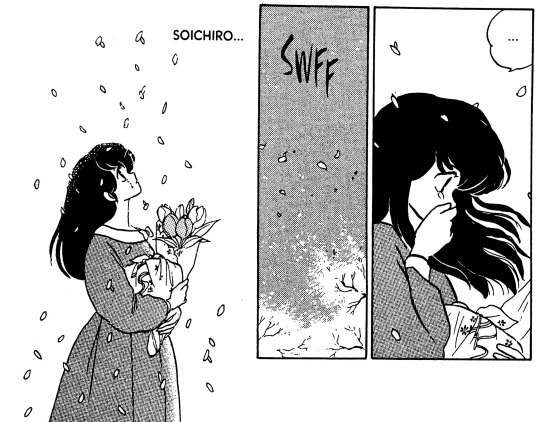
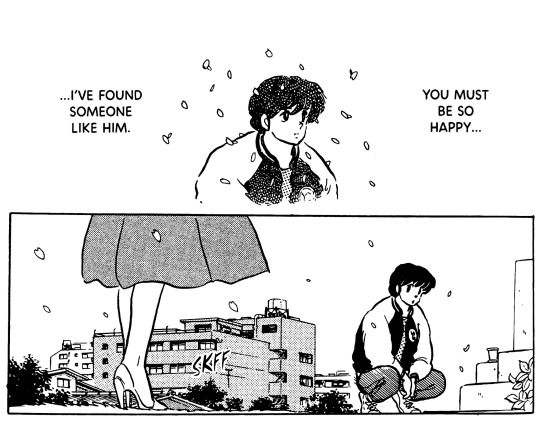
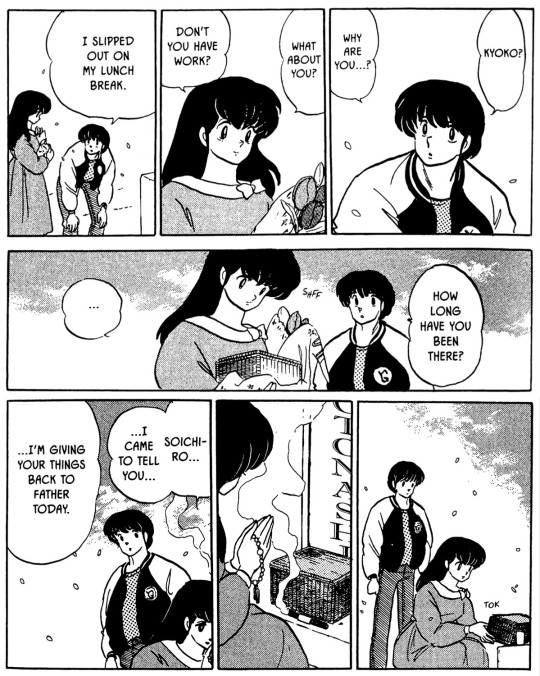
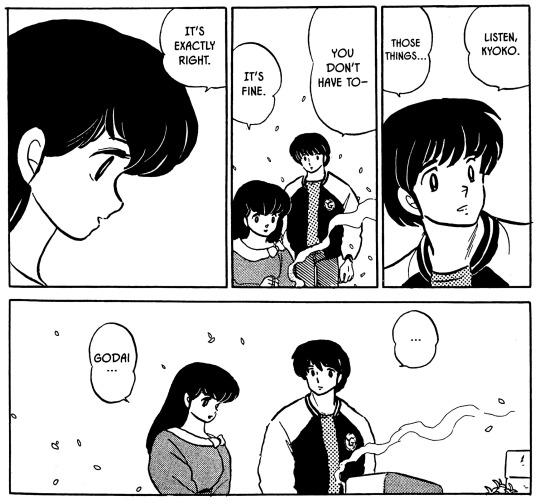
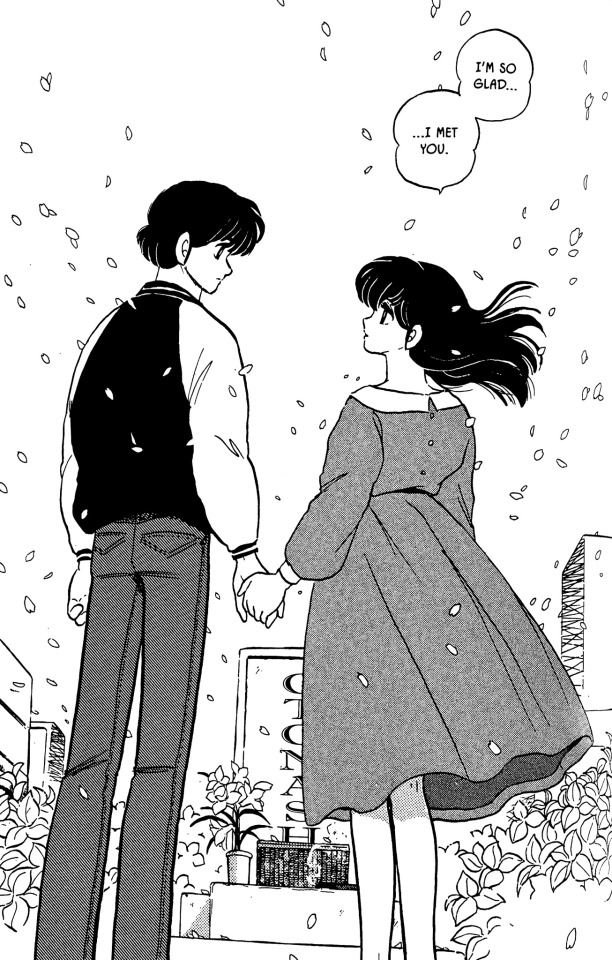
Ahhhhhh my feelings!!! Man I love this series.
Okay, let's review the major takeaways from this scene:
• Notice how the tension between Godai and Kyoko—Godai's struggle with insecurity and Kyoko's feelings for her deceased husband—mirrors the tension between InuKag. And notice that the reader is encouraged to sympathize with both Godai and Kyoko. Godai is not "at fault" for struggling with insecurity and feelings of jealousy. That's a natural human feeling to have, especially in a relationship that hasn't been anywhere near secure until very recently. And despite whatever jealousy or inadequacy he may be feeling, Godai tries to see things from Kyoko's perspective. Part of Godai's struggle—the heartache of it—is his understanding that Kyoko is also not at fault. It's not her fault that she married before she ever met Godai, it's not her fault her husband died, and it's not her fault that she's struggling with the grief of that tragedy. She's trying to reorient herself to her new life after loss; she's falling in love with Godai, but she's also scared of betraying her husband's memory. (Let's hold that mirror up to InuYasha now, shall we? SHALL WE?) Moving on from Soichiro emotionally represents to Kyoko a breach of duty to a loved one.
• To reiterate: neither Godai nor Kyoko are "at fault" in this situation. That's precisely why it's a tragedy. They both have to process painful, messy feelings; both their feelings are valid and understandable. (Hold that mirror up to InuKag, girl. HOLD IT UP.)
• Notice how Godai explicitly acknowledges that loving Kyoko means loving the Kyoko who once loved Soichiro. "On the day I met Kyoko, you were already within her. That's the Kyoko I fell in love with." It's impossible to divorce Kyoko from her feelings for her former husband: that part of her life significantly shaped her into who she is. And I just love that Godai is hashing out his feelings at Soichiro's grave: it shows a sort of respect for Soichiro's memory, but more importantly it also shows that Godai knows his negative feelings can't ultimately be "fixed" by Kyoko. If she could fix them, he'd be having this conversation with her. (And by this point in the series they have had this conversation.) But Godai knows he's the only one who can truly work through/resolve his insecurity—especially now, when Kyoko has already assured him that she loves him—and I love how the scene's setting subtly demonstrates that. Soichiro's ghost is haunting Godai's feelings, not Kyoko's, and Godai is trying to work through that with Soichiro himself. There's no love triangle to resolve here: what needs resolving is Godai's own feelings of inadequacy which no amount of assurance from Kyoko can ultimately "fix." This is his ghost to fight. (We get an echo of this kind of inner conflict in chapter 458 of InuYasha: Kagome directly wrestles with the "ghost" of Kikyo and struggles toward some resolution of her own insecurities.... Only for the Kaō arc to come along later and materially damage that resolution and character growth for no clear reason, BUT I DIGRESS.) And this scene shows that Godai wins that fight: he comes to understand that loving Kyoko has to include accepting her past. Kagome reaches a very similar understanding in chapters 175 and 176 of InuYasha.
• To reiterate: Maison Ikkoku's conclusion is not the resolution of a "love triangle." It's the resolution of a series-long conflict, which is completely different. In order for love triangles to work—to actually function as love triangles—two competing love interests have to be viable options. This is quite evidently not the case in Maison Ikkoku: Soichiro is dead at the start of the series. It's literally impossible for Kyoko to choose him in any meaningful way. RT blatantly acknowledges this early in the series when Kyoko's father-in-law tells her she has to live her life. I cannot stress enough how self-consciously the series is not about a love triangle between Godai/Kyoko/Soichiro. (Mitaka is another matter entirely, for a different post.) Rather, the series is about the damaging power of grief in our lives, the rocky and painfully non-linear journey to healing from that grief, and how messy, fraught, and ultimately profoundly beautiful it is to love another person for exactly who they are — past pain/trauma and all. (Please for the love of heaven hold that mirror up to InuKag.)
• No, you know what? I'm not leaving that at a parenthetical. I'm just gonna say it: exactly as Maison Ikkoku is not about a love triangle, InuYasha isn't either. For the same reasons as stated above, the Inu/Kag/Kik dynamic is not ultimately a love triangle because Kikyo is dead at the start of the series. And while her spirit is magically revived—in an altered/diminished form—she is still not truly alive. The story conspicuously communicates this: her body is literally created from decomposing bones and cannot sustain itself (she needs to consume souls—other deceased spirits—to remain animated), symbolically suggesting she is of the dead even as she walks among the living. This is a facsimile of life. RT is not subtle about this. Kikyo is a tragic and complex character whose arc can be interpreted in many ways, but I think it's fair to say that the series self-consciously represents her as a past which can't be recovered. The damage has been done. She is dead, time continues to move forward, and there's no reversing that. (That's, again, why it's a tragedy.) Even her resurrected body symbolically represents this reality via death imagery. Ergo, from the very start of the series—just as we see in Maison Ikkoku—Kikyo is not a truly viable option for InuYasha. He can't choose her in any meaningful way. To "choose" her would be to essentially choose death—abandonment of life—just as Kyoko choosing Soichiro would make her "a wife who hadn't died yet." Kikyo represents an irrecoverable past just as Soichiro does. And the main thematic trajectory of each series does not suggest that Kyoko/InuYasha should give up on life by choosing death — it suggests they should choose life. Godai and Kagome conspicuously represent life, the possibility of living into the future. (Kagome is literally from the future, that's how unsubtle RT is about this.)
(A quick aside while we're here: no, Kikyo's not being a viable option does nothing to diminish the sincerity of InuYasha's feelings for Kagome. Kagome is not a "second choice," for the love of God the series blatantly addresses that very thing many, many times—like it's right there y'all—and I have already written a long ass post about why Kagome's insecurity over InuYasha's feelings for her shouldn't be taken as gospel truth.)
So, rather than being an actual love triangle, I think the Inu/Kag/Kik dynamic is a complicated emotional landscape that explores the same themes Maison Ikkoku does: how grief and trauma affect our lives, how painful and messy it can be to heal from that grief, and that loving someone—choosing to take that mutual risk with them—means trusting that they mean it when they tell/show us they love us, and choosing to trust them more than our own insecurities.
It's just that Maison Ikkoku explores those themes a little better. 😅 Which is why I think it makes a good mirror for re-examining InuKag: all the same themes without all the narrative failings and missed opportunities. ✌🏼
#it's done!!!! I've been sitting on this since March @__@#there was a whole other section comparing and contrasting Maison Ikkoku's conclusion with chapter 176 in InuYasha...#but it was too meandering and I lost the plot on it so maybe I'll try that again in a different post one day lol#InuKag#Maison Ikkoku#analysis#that whole section where I basically said 'some emotional intelligence is required to understand InuYasha's situation'#that same sentiment caused the biggest shit fest I've ever seen on a fandom server#it was truly mind boggling#so naturally i've decided to write a 2200 word essay to more thoroughly explore that idea 😈
81 notes
·
View notes
Note
Holy cow, they're filled up already? 🤣🤣 What kind of requests did you get? I'm curious!
All the good things! 😎
Nah but really; I got some great requests for Blue Lock, Yu Yu Hakushou, Windbreaker (whomever sent that Sugishita one I adore you so <3)- and I got a genie wish! all the great things!!! My writing spirit has been refreshed! I can't wait to write them all now- past and present prompts!
Thanks for asking- and again thank you everyone who sent in requests! I never expect to receive so many, and for that I'm truly grateful! <3 <3 <3 Thank you all very much!
#squiggily speaks#ask#anon#kind anons#gonna be so real I was mind boggled akjlrejklarjkaejk#y'all move like the WIND!#I appreciate it truly!#it makes my heart so happy!
12 notes
·
View notes
Text
it must be sad to be someone who can't find and doesn't want to look for the meaning in anything. thinking art is boring, thinking the long, drawn-out semi-abstract explanations musicians and artists give before they show their work is meaningless fake bullshit. it must be such a dull world to live in where one doesn't obsessively examine every word, every note from a work you love to find the beauty and the message and meaning and purpose in every grain of sand that gives it form. how sad.
#bluebird.txt#yes this is a vaguepost no it's not about anyone here at all#but like. curtains are just blue type bitches how does it feel for the world to be so sad and empty?#im out here overanalyzing every word out of a children's movie and finding even the most obvious perhaps of meanings in a certain note#or repeated motif#and it makes everything look wonderful#adds to my appreciation for it for the detail no matter how small or seemingly inconsequential#everything is a choice and some people don't understand that#when art is good it's all about intention#speaking as someone who's working on their art (music) and learning how to make those choices#and even that there are choices i can make bc sometimes im like woah i didn't know i could do that!#and those choices make such a huge difference those tiny choices#anytime you watch something even if the author or composer or whoever didnt think much of a certain choice#they still made it and it still makes it different than it would've been if they'd chosen a different word/chord/color#the world and art can be beautiful. why would you choose to see it so boringly???#truly it boggles the mind#violaposting#this is why i like theory
14 notes
·
View notes
Text
it really feels like you're staring into the void when you watch people debate which side is ~more justified~ in their child murder
87 notes
·
View notes